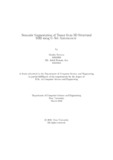| dc.contributor.advisor | Parvez, Mohammad Zavid | |
| dc.contributor.advisor | Reza, Tanzim | |
| dc.contributor.author | Farzana, Maisha | |
| dc.contributor.author | Any, Md. Jahid Hossain | |
| dc.date.accessioned | 2021-06-01T06:28:33Z | |
| dc.date.available | 2021-06-01T06:28:33Z | |
| dc.date.copyright | 2020 | |
| dc.date.issued | 2020-03 | |
| dc.identifier.other | ID: 16101108 | |
| dc.identifier.other | ID: 16101164 | |
| dc.identifier.uri | http://hdl.handle.net/10361/14459 | |
| dc.description | This thesis is submitted in partial fulfillment of the requirements for the degree of Bachelor of Science in Computer Science and Engineering, 2020. | en_US |
| dc.description | Cataloged from PDF version of thesis. | |
| dc.description | Includes bibliographical references (pages 37-40). | |
| dc.description.abstract | Automated semantic segmentation of brain tumors from 3D MRI images plays a significant role in medical image processing. Early detection of these brain tumors is
highly requisite for the treatment, screening, diagnosis and surgical pre-planning of
the anomalies. The physicians normally follow the manual way of delineation to process the diagnosis of tumors which is time consuming, requires too much knowledge
of anatomy and is too much expensive. To resolve these limitations, convolutional
neural network (CNN) based autoencoder model is proposed which performs automated segmentation of brain tumors from 3D MRI brain images. Several algorithms
such as image normalization, image augmentation, image binarization are used for
data pre-processing. Furthermore, autoencoder based U-Net architecture is developed to extract the key features of the tumor and train the model. Later on, the
model is applied to the new 3D MRI brain images to test the accuracy of it by
segementing the tumor region. The proposed model enables enhancing the performance and accuracy of semantic segmentation of brain tumor as compare to the
other existing models. Applying the proposed method, the accuracy is obtained
upto 96.06% considering the 66 subjects. Finally, this approach is a well-structured
model for segmenting the tumor region from MRI brain images which may assist
the physicians for providing therapy and better treatment to the patient. | en_US |
| dc.description.statementofresponsibility | Maisha Farzana | |
| dc.description.statementofresponsibility | Md. Jahid Hossain Any | |
| dc.format.extent | 40 pages | |
| dc.language.iso | en_US | en_US |
| dc.publisher | Brac University | en_US |
| dc.rights | Brac University theses are protected by copyright. They may be viewed from this source for any purpose, but reproduction or distribution in any format is prohibited without written permission. | |
| dc.subject | Brain Tumor | en_US |
| dc.subject | Semantic Segmentation | en_US |
| dc.subject | MRI | en_US |
| dc.subject | CNN | en_US |
| dc.subject | Pre-processing | en_US |
| dc.subject | Autoencoder | en_US |
| dc.subject | U-Net Architecture | en_US |
| dc.title | Semantic segmentation of tumor from 3D Structural MRI using U-Net Autoencoder | en_US |
| dc.type | Thesis | en_US |
| dc.contributor.department | Department of Computer Science and Engineering, Brac University | |
| dc.description.degree | B. Computer Science | |

